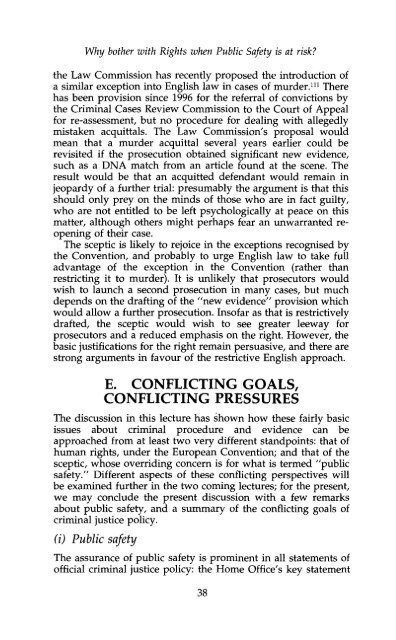Human Rights, Serious Crime and Criminal Procedure - College of ...
Human Rights, Serious Crime and Criminal Procedure - College of ...
Human Rights, Serious Crime and Criminal Procedure - College of ...
- No tags were found...
Create successful ePaper yourself
Turn your PDF publications into a flip-book with our unique Google optimized e-Paper software.
Why bother with <strong>Rights</strong> when Public Safety is at risk?the Law Commission has recently proposed the introduction <strong>of</strong>a similar exception into English law in cases <strong>of</strong> murder. 111 Therehas been provision since 1996 for the referral <strong>of</strong> convictions bythe <strong>Criminal</strong> Cases Review Commission to the Court <strong>of</strong> Appealfor re-assessment, but no procedure for dealing with allegedlymistaken acquittals. The Law Commission's proposal wouldmean that a murder acquittal several years earlier could berevisited if the prosecution obtained significant new evidence,such as a DNA match from an article found at the scene. Theresult would be that an acquitted defendant would remain injeopardy <strong>of</strong> a further trial: presumably the argument is that thisshould only prey on the minds <strong>of</strong> those who are in fact guilty,who are not entitled to be left psychologically at peace on thismatter, although others might perhaps fear an unwarranted reopening<strong>of</strong> their case.The sceptic is likely to rejoice in the exceptions recognised bythe Convention, <strong>and</strong> probably to urge English law to take fulladvantage <strong>of</strong> the exception in the Convention (rather thanrestricting it to murder). It is unlikely that prosecutors wouldwish to launch a second prosecution in many cases, but muchdepends on the drafting <strong>of</strong> the "new evidence" provision whichwould allow a further prosecution. Ins<strong>of</strong>ar as that is restrictivelydrafted, the sceptic would wish to see greater leeway forprosecutors <strong>and</strong> a reduced emphasis on the right. However, thebasic justifications for the right remain persuasive, <strong>and</strong> there arestrong arguments in favour <strong>of</strong> the restrictive English approach.E. CONFLICTING GOALS,CONFLICTING PRESSURESThe discussion in this lecture has shown how these fairly basicissues about criminal procedure <strong>and</strong> evidence can beapproached from at least two very different st<strong>and</strong>points: that <strong>of</strong>human rights, under the European Convention; <strong>and</strong> that <strong>of</strong> thesceptic, whose overriding concern is for what is termed "publicsafety." Different aspects <strong>of</strong> these conflicting perspectives willbe examined further in the two coming lectures; for the present,we may conclude the present discussion with a few remarksabout public safety, <strong>and</strong> a summary <strong>of</strong> the conflicting goals <strong>of</strong>criminal justice policy.(i) Public safetyThe assurance <strong>of</strong> public safety is prominent in all statements <strong>of</strong><strong>of</strong>ficial criminal justice policy: the Home Office's key statement38
















